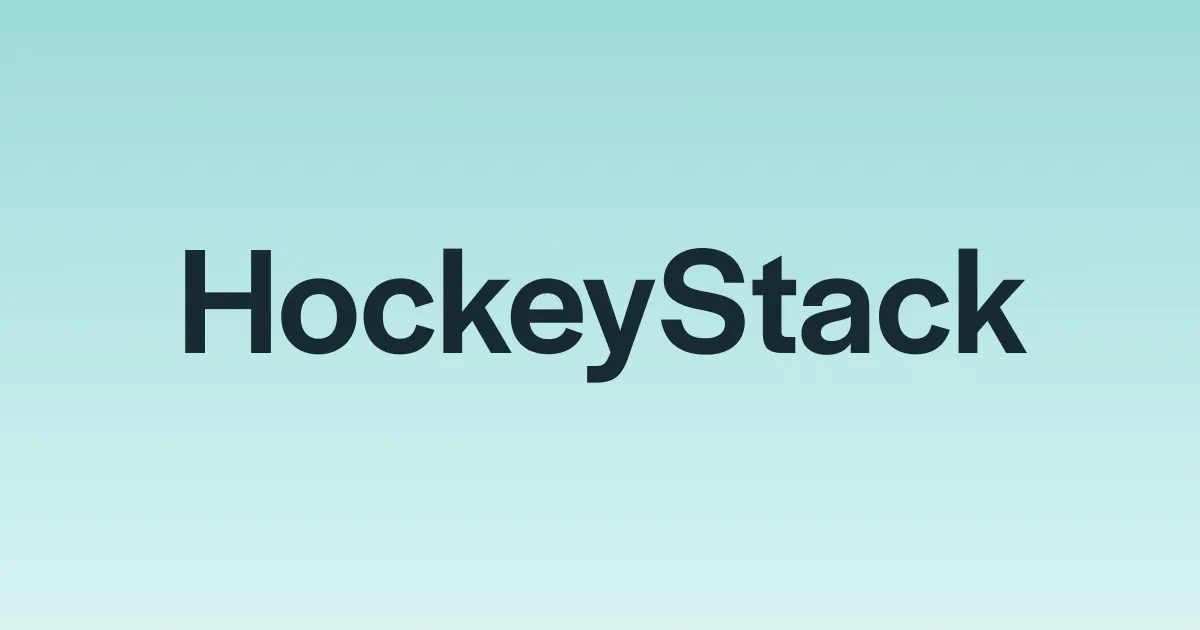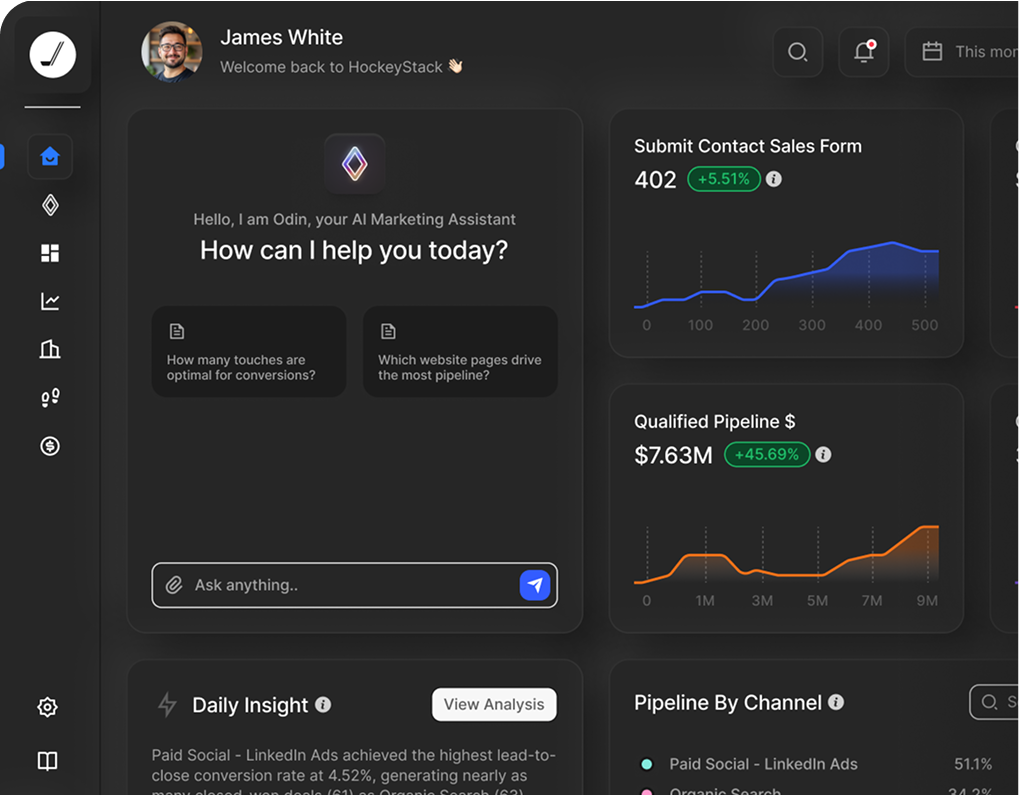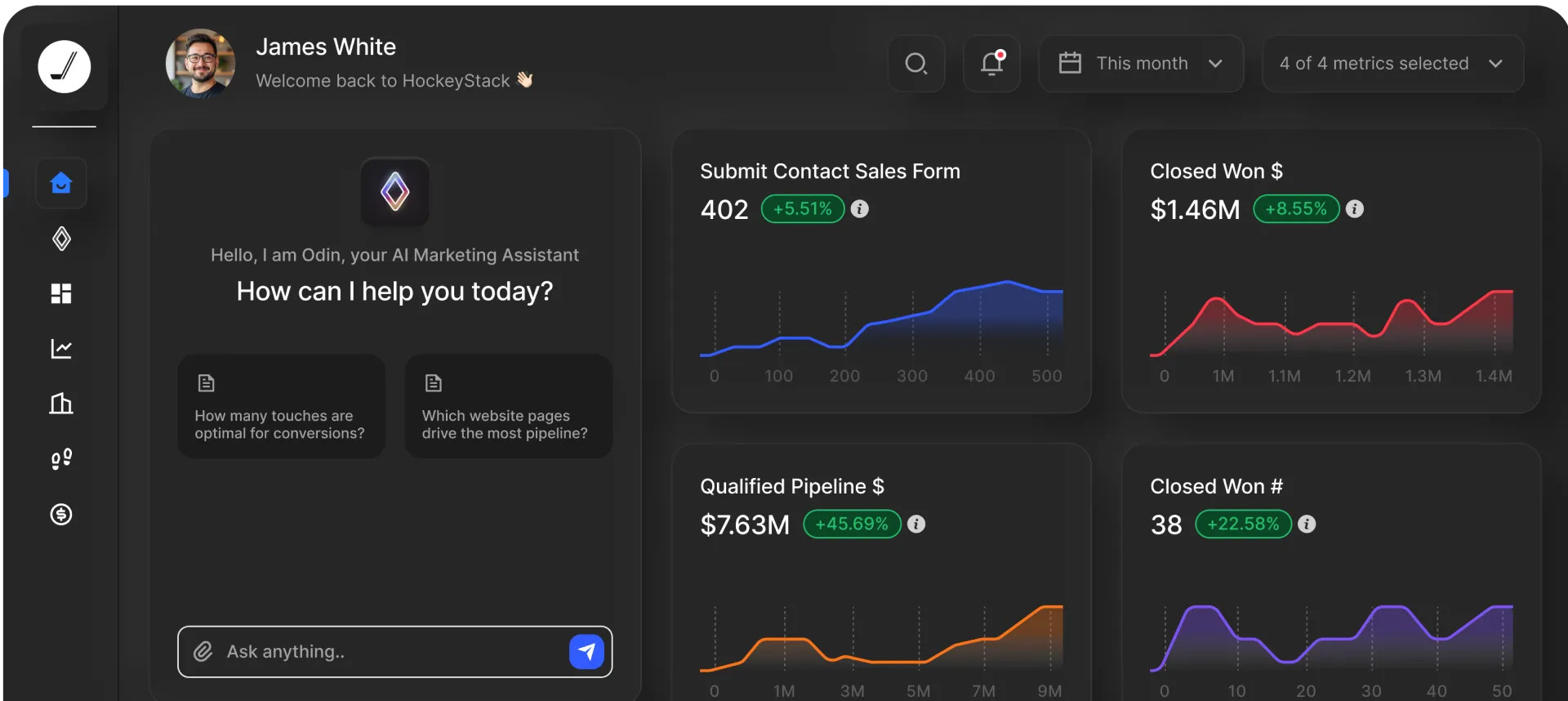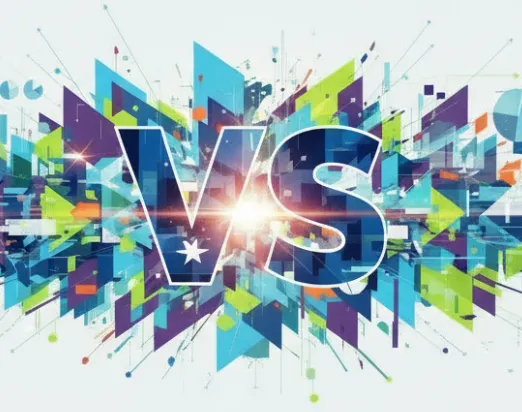CaliberMind vs Bizible (vs HockeyStack): B2B Platforms Compared

CaliberMind vs Bizible (vs HockeyStack): B2B Platforms Compared

Most B2B deals still show up as "direct" or "organic" traffic in attribution reports. That attribution gap leaves marketing teams without clear insights into which channels actually drive revenue and pipeline growth. CaliberMind, Bizible, and HockeyStack each tackle this problem with different data approaches. This article covers their technical architectures, implementation requirements, and key feature differences to help determine which platform fits your GTM strategy.
How Do CaliberMind, Bizible, and HockeyStack Compare for B2B Attribution?
The three platforms have different approaches to solving attribution complexity in modern B2B sales cycles:
Bizible uses Adobe's Munchkin cookie technology and requires Salesforce or Dynamics CRM. Cookie deprecation limits its tracking capabilities.
CaliberMind is an attribution and GTM intelligence platform that consolidates attribution and GTM data into BigQuery, which requires technical expertise for configuration and ongoing management.
HockeyStack uses cookieless fingerprinting technology with AI agents (Odin and Nova). No SQL skills or data engineering required.
HockeyStack solves attribution and account intelligence challenges with unified data collection, privacy-compliant tracking, and AI automation that executes GTM strategies without creating more reports to scroll through.
CaliberMind vs Bizible vs HockeyStack Feature Comparison
The comparison below isolates technical capabilities, implementation complexity, and resource requirements that determine platform success within existing GTM technology stacks.
HockeyStack stands out with account intelligence capabilities and AI agents that neither competitor offers, plus faster implementation timelines. CaliberMind provides data flexibility for teams with BigQuery expertise, while Bizible serves organizations committed to Adobe's ecosystem despite cookie tracking limitations.
How Do CaliberMind, Bizible, and HockeyStack Handle Data Architecture?
HockeyStack's action-based architecture delivers complete buyer journey visibility without technical complexity, while CaliberMind requires extensive BigQuery management and Bizible limits organizations to rigid Adobe-Salesforce integrations.
HockeyStack captures every buyer touchpoint as timestamped actions with complete context. The platform handles data modeling and integration maintenance automatically, eliminating the need for data engineering teams while providing cookieless tracking.
CaliberMind requires BigQuery expertise, schema maintenance, and ongoing pipeline management. This technical overhead slows implementation and increases costs significantly.
Bizible restricts data sources to Salesforce or Dynamics CRM only, creating attribution blind spots. Cookie dependency becomes increasingly problematic as browsers phase out third-party tracking.
HockeyStack scales from mid-market to enterprise without additional technical resources, while competitors demand specialized expertise or accept significant limitations.
How Do Attribution Models Compare Across CaliberMind, Bizible, and HockeyStack?
HockeyStack includes cohort-based incrementality testing that compares campaign performance against control groups, proving true causal impact before budget decisions. The platform offers seven attribution models including first-touch, last-touch, linear, W-shaped, time-decay, and custom weighting approaches. Marketing teams can switch between models dynamically without rebuilding reports.
CaliberMind supports sophisticated multi-touch models with custom weighting logic tailored to specific sales cycles. However, implementing these capabilities requires data engineering expertise and weeks of model tuning. The platform lacks embedded lift testing, requiring manual incrementality experiments through separate workflows.
Bizible provides standard attribution models (first-touch, W-shaped, full-path) with limited customization options. The platform lacks incrementality testing entirely, leaving marketing teams to guess whether attribution correlations represent actual causal relationships between touchpoints and pipeline generation.
HockeyStack's out-of-box incrementality testing separates correlation from causation through statistical analysis, while competitors either require extensive technical resources or provide no causal impact validation.
How Do Account Intelligence and Workflow Automation Compare Across Platforms?
HockeyStack transforms attribution data into automated Account Plans that aggregate anonymous website behavior, CRM activities, and call transcripts into AI-generated playbooks. Stakeholder Maps surface buying committee members automatically, while Workflows trigger personalized engagement sequences based on scoring thresholds and behavioral patterns. When prospects visit pricing pages repeatedly, automated workflows enrich accounts, alert sales reps via Slack, and sync leads to advertising platforms without manual handoffs.
CaliberMind focuses on data unification and attribution modeling but lacks native account intelligence generation or automated workflow capabilities. Marketing teams must build custom integrations to connect attribution insights with sales execution tools.
Bizible remains limited to basic lead routing and scoring within Salesforce environments, without comprehensive account intelligence features or workflow automation beyond standard CRM capabilities.
HockeyStack eliminates the gap between marketing intelligence and sales execution that attribution-only platforms cannot address, providing coordinated GTM automation that competitors require custom development to achieve.
How Do AI Capabilities Compare Across CaliberMind, Bizible, and HockeyStack?
HockeyStack provides AI agents that eliminate manual analysis work consuming marketing operations hours weekly. Odin converts natural language questions into custom dashboards and budget recommendations, while Nova automates account research by aggregating case studies, SEC filings, job postings, and competitive intelligence. The platform's explainable scoring shows exactly why accounts rank high or low, building sales team trust with transparent logic like "Enterprise SaaS, 5+ pricing page visits, similar to three closed deals."
CaliberMind offers AskCal chatbot that generates insights from unified marketing data but lacks execution capabilities and transparent scoring logic. The chatbot surfaces basic performance metrics and answers standard attribution questions but cannot execute workflows or automate account research processes.
Bizible provides predictive lead scoring within Salesforce environments but lacks conversational AI interfaces or transparent scoring explanations. Marketing teams must interpret predictive models without understanding the underlying logic driving account prioritization recommendations.
HockeyStack's AI agents actually replace manual analysis tasks and execute strategies automatically, while competitors provide basic insights that still require human interpretation and action.
How Do Implementation Timelines Compare Across CaliberMind, Bizible, and HockeyStack?
HockeyStack implements a structured deployment methodology with attribution dashboards within 3 weeks, followed by Account Intelligence, AI agents, and workflow automation completed within 6 weeks total. This includes dedicated customer success management, comprehensive training programs, and validation against existing reporting systems with ongoing optimization support.
CaliberMind requires 6-12 weeks for Salesforce field mapping, BigQuery schema design, data pipeline configuration, and technical integrations before marketing teams see actionable insights. The platform demands ongoing data engineering resources for schema maintenance, pipeline monitoring, and integration updates.
Bizible implementations typically require 8-16 weeks depending on Adobe marketing cloud complexity and existing Salesforce customizations. Many organizations require agency support for implementation, adding coordination overhead and extending timelines beyond initial estimates.
HockeyStack delivers complete attribution and account intelligence capabilities faster than competitors achieve basic attribution setup, while providing dedicated success management that eliminates technical implementation risk.
Who Should Choose CaliberMind vs Bizible vs HockeyStack?
HockeyStack provides the best fit for mid-market and enterprise GTM and marketing teams seeking unified attribution, account intelligence, and workflow automation without requiring specialized technical expertise or ecosystem limitations.
The platform eliminates attribution blind spots and manual account research simultaneously through cookieless tracking and automated Account Plans. The platform replaces multiple attribution, account research, and workflow automation tools with integrated AI agents that execute GTM strategies rather than generating reports requiring manual analysis.
CaliberMind serves organizations with existing data engineering teams managing complex technology stacks who can handle BigQuery maintenance overhead. This approach works best for teams with in-house data engineering and analytics resources, existing BigQuery warehouse infrastructure, and custom attribution model requirements beyond standard approaches.
Bizible works effectively for organizations deeply committed to Adobe-Marketo-Salesforce ecosystem integration who plan to maintain that technology stack long-term. The platform suits teams with heavy Adobe marketing cloud investments, Salesforce-centric GTM operations, and limited need for attribution sources outside Adobe's ecosystem.
What B2B Attribution Platform Is Right for Your Organization?
This comparison covered data architectures, attribution models, account intelligence capabilities, AI agents, and implementation timelines across three different approaches to B2B attribution.
CaliberMind provides data flexibility for organizations with existing BigQuery expertise, while Bizible's Salesforce integration works within Adobe's marketing ecosystem. On the other hand, HockeyStack combines cookieless attribution, AI-generated Account Plans, transparent scoring, and workflow automation that transforms attribution insights into automated GTM execution - capabilities neither competitor can match.
Book a demo to explore HockeyStack's AI agents and attribution capabilities.
FAQs About HockeyStack
Is Cookieless Tracking Compliant with Privacy Regulations?
HockeyStack uses device fingerprinting with first-party scripts and server-side processing, eliminating third-party cookies entirely. This meets GDPR and CCPA requirements while maintaining attribution accuracy as browsers phase out cookies.
WhatMakes HockeyStack's AI Agents Different from Chatbots?
Odin and Nova understand your specific pipeline data and execute actions automatically. Ask "Which campaigns drive enterprise deals?" and get instant insights. Nova generates Account Plans and triggers workflows based on actual buyer behavior, not generic responses.
How Long Does HockeyStack Take to Implement?
Attribution dashboards within 3 weeks, full deployment in 6 weeks with dedicated success management.
Do You Own Your Data With HockeyStack?
Yes. You control all raw event data and can export any report or dataset. HockeyStack handles data modeling without locking your records in proprietary systems.
How does pricing scale with more integrations?
Monthly tracked users, not connector count. Adding HubSpot, LinkedIn Ads, or data warehouse connections doesn't trigger additional charges.
Does HockeyStack integrate with existing tools?
Any tool with API access or Salesforce sync connects to HockeyStack through native integrations. Custom tools connect via webhooks or ingestion API.
AI Marketing Analytics: Features, Benefits, Use Cases, & Top Tools
Learn the fundamentals of AI marketing analytics and how it drives more successful campaigns and higher ROI.

More Blog Posts

Ready to see HockeyStack in action?
HockeyStack turns all of your online and offline GTM data into visual buyer journeys and dashboards, AI-powered recommendations, and the industry’s best-performing account and lead scoring.

Ready to See HockeyStack in Action?
HockeyStack turns all of your online and offline GTM data into visual buyer journeys and dashboards, AI-powered recommendations, and the industry’s best-performing account and lead scoring.




